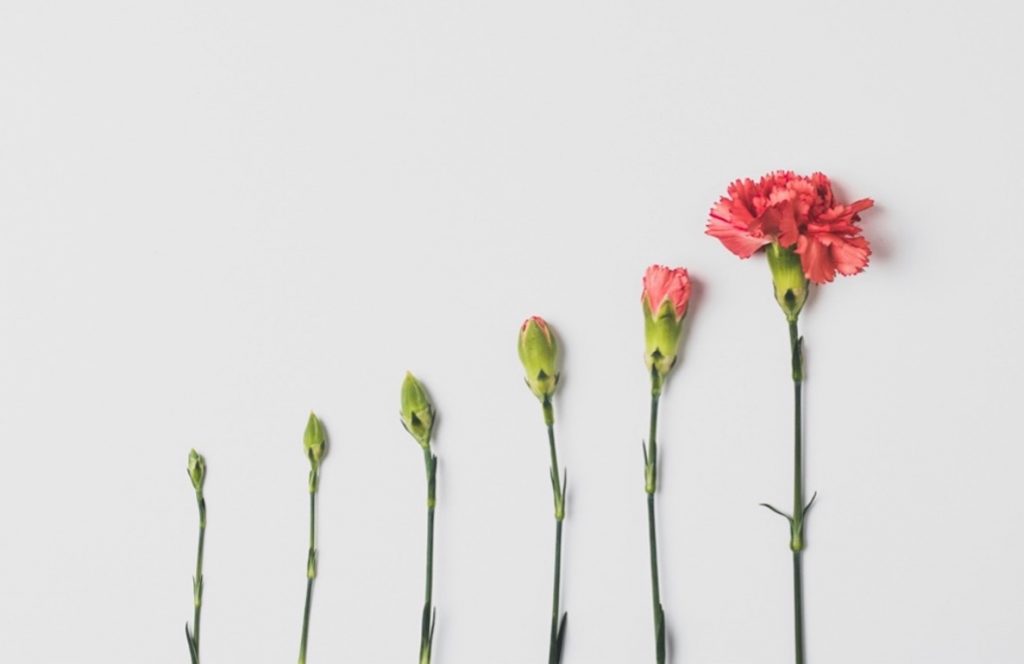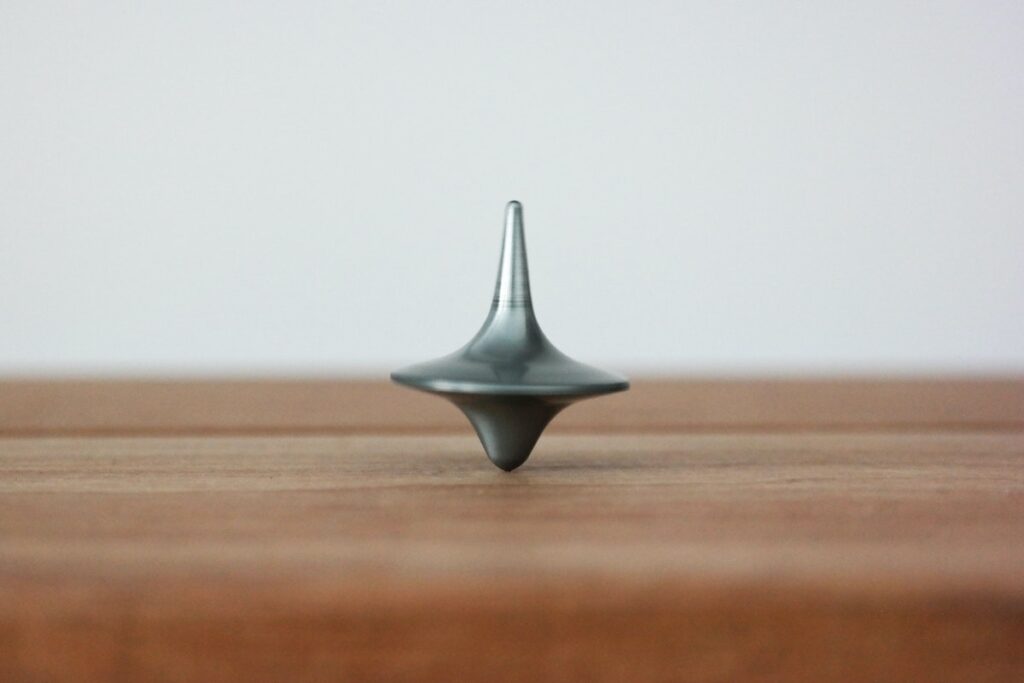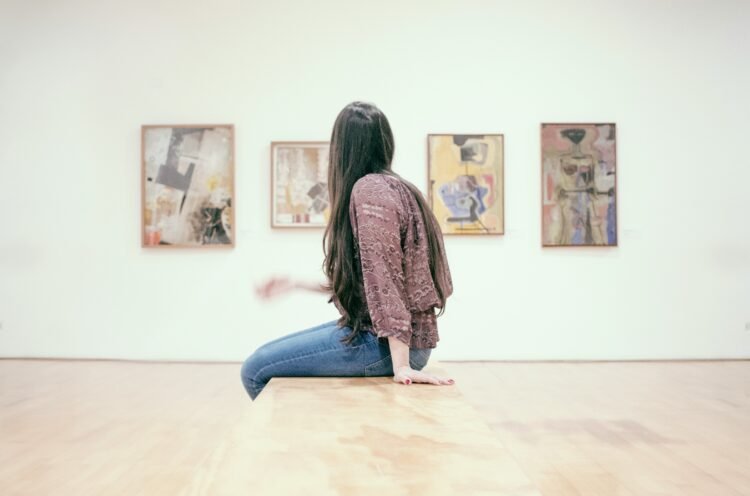
Have you ever ever been totally transfixed by a portray? Possibly a sculpture evoked some deep feeling or reminiscence. In that case, it’s possible you’ll perceive the enchantment of artwork remedy. Artwork remedy permits individuals to create and discover the which means behind their creations with a therapist or group (Edwards D., 2013). A number of research present that engagement with artwork, from remedy to non-clinical creativity, is related to optimistic psychological well being results (Uttley L. et al., 2015; Jensen A. & LO B., 2018; Smriti D. et al., 2022).
Artwork remedy works by means of a “triangular relationship,” the interaction between creator, art work, and viewer(s) (Bierschenk L., 2022). The creator attracts on their interior world, expressing a part of themselves, for others to view and interpret. However what if a fourth component was added to this relationship? How does being in an artwork gallery have an effect on artwork remedy?
Artwork galleries are often called “therapeutic areas” for enhancing well-being and psychological well being (Coles A. et al., 2019; Goodman-Casanova J.M. et al., 2023). Scott, Holttum, and Fischer recognised the necessity to determine how gallery-based artwork remedy was efficient, so that they carried out a research to generate idea about its underlying mechanisms. Their outcomes confirmed enchancment in psychological wellbeing and aim setting for these on this remedy, and so they started to explain the mechanisms of change and the way it could also be helpful for future teams and research.

Artwork remedy permits individuals to create and discover the which means behind their creations with a therapist or group.
Strategies
The authors used a quantitative method to assess the influence of gallery-based artwork remedy on psychological well being, and a qualitative method to develop idea. The ‘remedy’ lasted twelve weeks, assembly as soon as per week at knowledgeable artwork gallery with a personal studio for the group. Periods concerned viewing, making, and discussing artwork, and reflection durations.
Members have been fifteen younger individuals (ages 12-18) of blended gender and ethnic backgrounds, all experiencing varied psychological well being difficulties. Two artwork psychotherapists and one artist participated within the qualitative side of the research.
Information was collected from:
- Questionnaires administered earlier than and after periods:
- YP-CORE for psychological wellbeing
- Aim Primarily based Outcomes for self-set objectives
- Rosenberg Self Esteem Scale for vanity
- Filmed gallery remedy periods
- Reflections from members
The research used quantitative information from questionnaires to analyse self-reported adjustments in psychological well being. The grounded idea analysis technique was used to analyse qualitative information from movies and reflections and determine themes in how the remedy was efficient, which have been dropped at members for additional suggestions.
Outcomes
Quantitative Outcomes
Statistical evaluation of pre- and post-treatment questionnaire scores confirmed optimistic imply adjustments in all measures:
- Self-Esteem: 2.10
- Psychological Wellbeing (decrease scores optimistic): –7.00
- 1st Self-Set Targets: 2.57
- 2nd Self-Set Targets: 2.75
The vanity change was not clinically important (p = 0.194). Adjustments in psychological wellbeing and second self-set objectives measures have been important on the 5% stage (p = 0.020, p = 0.011). The change within the first self-set aim scores was important on the 1% stage (p = 0.003).
Qualitative Outcomes
The next themes emerged from quantitative evaluation.
Humor
Humor arose from a way of security and playfulness within the group. Self-deprecation helped members to not take themselves too significantly, whereas making severe issues enjoyable made them simpler to course of. A playful ambiance eased the stress of claiming or creating one thing profound and made the periods a optimistic social interplay.
Motion
Transferring between the remedy studio and the gallery allowed completely different experiences to occur concurrently and literal adjustments in perspective fostered figurative perspective shifts. Transferring from the studio to the gallery modified the therapists into individuals, fellow viewers of artwork, which humanised them.
Valued and Essential
Being in a gallery despatched members the message that they and their artwork have been valued and essential. The presence of an artist, number of supplies obtainable, and studying new strategies elevated members’ confidence. A theme emerged of studying to worth that which is “damaged” by embracing imperfections.
Completely different Viewpoints
Discussing artwork in several contexts helped members open their minds to completely different viewpoints about themselves and previous periods. By noticing completely different opinions when viewing the identical art work a second time, members practiced flexibility and self-reflection.
Therapists’ Function Flexibility
The presence of knowledgeable artist made the therapists members within the group, not simply professionals facilitating it, which helped the opposite members be extra open and make extra options. Completely different roles (providing assist, supplying artwork supplies, asking questions, taking images) helped therapists take a look at the group in several methods and make new connections.

Gallery-based artwork remedy led to important enhancements in psychological wellbeing and goal-setting, with members additionally reporting enhanced self-expression, perspective shifts, and feeling valued.
Conclusions
The authors concluded that members’ psychological wellbeing and motion in the direction of self-set objectives improved by means of the gallery-based artwork remedy. They theorised that these enhancements took place by means of the “various focus” of the group, together with schooling by the artist, give attention to artwork, and focus in and outdoors the artwork studio. Their idea was that optimistic change in members grew out of this “surroundings which was skilled as each secure sufficient and versatile.” The method of theory-building allowed for discussions and reflexivity that flattened hierarchies between therapists and sufferers and facilitated deeper reflection on the self and the group.

The research concluded {that a} versatile, secure, and creatively partaking surroundings fostered private development and wellbeing.
Strengths and Limitations
The research used a excessive stage of reflexivity, because the group mirrored upon itself, and members mirrored upon their particular person experiences inside the group. Particularly essential was the therapists’ reflection on their roles and the way the group affected them. Self-reflexivity is very essential, particularly when constructing system idea and dealing with younger individuals, so it’s nice to see a research that paid particular consideration to the therapists’ experiences (Mohamud H., 2021).
By taking a look at a number of completely different areas of potential psychological well being enchancment (psychological wellbeing, aim setting, and vanity), the paper highlighted the significance of a multi-faceted method when treating psychological well being considerations. Tying these into gallery-based artwork remedy additional emphasised the potential effectiveness of this remedy on a wide range of impactful psychological wellness components.
The participant pattern was small and restricted to younger individuals referred to the NHS in a single space of England. There was little information given about members’ gender, race and ethnicity, or socioeconomic background. Subsequently, we don’t understand how these components could have influenced or confounded the outcomes of this research, or if the outcomes could be extrapolated to a bigger inhabitants.
This research was largely centered on constructing idea about gallery-based artwork remedy teams, and this reflexive course of could have influenced the outcomes. That’s, reflecting on the processes and experiences of the group could have impacted members’ sense of wellbeing or aim setting, over and above the influence of the particular remedy group itself.
For the qualitative outcomes, it was typically unclear how the authors arrived at their theoretical conclusions from the proof introduced. For instance, they theorize that “completely different environments could be useful in breaking into new methods of experiencing” after which quote a participant describing how anxiousness saved her motionless, however now she is extra energetic. The supposed conclusion is that the remedy influenced this variation, however it’s unclear from the participant’s precise quote that that is the case.

The research used a excessive stage of reflexivity, because the group mirrored upon itself, and people mirrored upon their experiences inside the group.
Implications
This research highlights the advantages of gallery-based artwork remedy for treating psychological well being in younger individuals. It improved general psychological wellbeing and aim setting and doubtlessly made a small distinction in vanity. This aligns with different research’ findings on museum and gallery-based artwork remedy for younger individuals (Coles A. & Harrison F., 2018). Nonetheless, as a result of this was a small-scale research with a restricted vary in participant demographics, additional large-scale research are wanted involving completely different ages and ethnic teams to find out if the outcomes are related to the broader inhabitants.
As a part of theory-building, the authors spotlight that “transferring about adjustments what all of us assume and give attention to,” saying that bodily motion within the artwork gallery and studio allowed for altering viewpoints. Different research additionally spotlight the worth of artwork remedy in encouraging “open, inventive, and versatile pondering” (del Río Diéguez M. et al., 2024). This flexibility and openness are extraordinarily priceless within the remedy of psychological well being difficulties and has potential for wide-spread software (Kashdan T.B. & Rottenberg J., 2010). Extra analysis ought to be carried out on how clinicians can implement this type of remedy to additional facilitate cognitive flexibility.
The advantages and mechanisms specified by this research emphasize the significance of collaborating with artwork galleries and museums to create areas for this type of remedy to happen. It additionally raises questions on what sort of artwork or exhibitions is perhaps most helpful for remedy, or if studying about artwork (versus merely viewing artwork) has further advantages. Additional research alongside these traces could be very fascinating and helpful for medical software.
Lastly, though the research analysed suggestions from members and was in a position to spotlight lots of the potential underlying mechanisms by which gallery-based artwork remedy is efficient, I discovered that it lacked a deeper evaluation of the inventive, expressive side of this remedy. I’m nonetheless questioning how being round charming artwork could have contributed to the members’ interior expertise, to what del Río Diéguez M. et al. name “the genuine expression enabled by the aesthetic dimension” (2024). As somebody who doesn’t have any especial creative expertise, I discover this transcendent side of artwork to be essentially the most useful in artwork remedy. It stops me worrying about creating one thing profound and permits me to as a substitute entry deeper feelings and sensations. As Edwards D. (2013) stated, “Some experiences are past phrases.” This interior expertise and expression appear essential to the effectiveness of gallery-based artwork remedy, and additional research is required to discover this and solidify this side inside the present paper’s idea.

The research highlights the therapeutic worth of integrating artwork into psychological well being care, encouraging partnerships between clinicians and cultural establishments to create enriched and reflective areas.
King’s MSc in Psychological Well being Research
This weblog has been written by a scholar on the Psychological Well being Research MSc at King’s School London. A full checklist of blogs by King’s MSc college students from could be discovered right here, and you may observe the Psychological Well being Research MSc group on Twitter.
We frequently publish blogs written by particular person college students or teams of scholars finding out at universities that subscribe to the Nationwide Elf Service. Contact us in case you’d like to seek out out extra about how this might work to your college.
Hyperlinks
Main paper
Scott W., Holttum S., Fischer M. (2024) Artway: gallery artwork remedy group for younger individuals with psychological well being difficulties. Worldwide Journal of Artwork Remedy 2024 1-11.
Different references
Bierschenk L. (2022) The interchange in art-psychotherapy. Psychoanalytic Psychotherapy 2022 36(2) 174–190.
Coles A., Harrison F. (2018) Tapping into museums for artwork psychotherapy: An analysis of a pilot group for younger adults. Worldwide Journal of Artwork Remedy 2018 23(3) 115–124.
Coles A., Harrison F., Todd S. (2019) Flexing the body: Therapist experiences of museum-based group artwork psychotherapy for adults with complicated psychological well being difficulties. Worldwide Journal of Artwork Remedy 2019 24(2) 56–67.
del Río Diéguez,M., Jiménez C. P., Ávila B. S.-A., Bayón Pérez y C. (2024) Artwork remedy as a therapeutic useful resource built-in into psychological well being programmes: Elements, results and integration pathways (PDF). The Arts in Psychotherapy 2024 91(12).
Edwards, D. (2013). Artwork remedy. Sage Publications 2024 1-15. ISBN 1446201805.
Goodman‐Casanova J. M., Guzman‐Parra J., Duran‐Jimenez F. J., Garcia‐Gallardo M., Cuesta‐Lozano D., Mayoral‐Cleries F. (2023) Effectiveness of museum‐based mostly participatory arts in psychological well being restoration. Worldwide Journal of Psychological Well being Nursing 2023 32(5) 1416–1428.
Jensen A., LO B. (2018) Using arts interventions for psychological well being and wellbeing in well being settings. Views in Public Well being 2018 138(4) 209-214. [Abstract]
Kashdan T. B., Rottenberg J. (2010) Psychological flexibility as a basic side of well being. Scientific Psychology Evaluation 2010 30(7) 865-878.
Mohamud H. (2021) Reflections on programs idea: the position of self and reflexivity. Edpsy.org.uk 2021.
Smriti D., Ambulkar S., Meng Q., Kaimal G., Ramotar Okay., Park S. Y., Huh-Yoo J. (2022) Inventive arts therapies for the psychological well being of rising adults: A scientific overview. The Arts in Psychotherapy 2022 77 1-13.
Uttley L., Scope A., Stevenson M., Rawdin A., Taylor Buck E., Sutton A., Stevens J., Kaltenthaler E., Dent-Brown Okay., Wooden C. (2015) Systematic overview and financial modelling of the medical effectiveness and cost-effectiveness of artwork remedy amongst individuals with non-psychotic psychological well being issues. HTA on DVD/Well being Expertise Evaluation 2015 19(18) 1–120.



